
The Toff Goes to Market is a 1942 crime thriller novel by the British writer John Creasey. It was the eighth in his long-running featuring the gentleman amateur detective The Toff. It was one of a number of novels produced in the era that featured the booming wartime black market as a major plotline. It has been republished on a number of occasions.

They Never Say When is a 1944 thriller novel by the British writer Peter Cheyney. It is the sixth in his series of novels featuring the London private detective Slim Callaghan, a British version of the increasingly popular hardboiled American detectives.
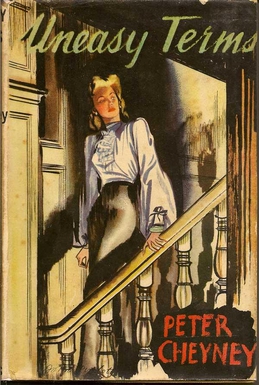
Uneasy Terms is a 1946 crime thriller novel by the British writer Peter Cheyney. It was the seventh and last in his series featuring the London-based private detective Slim Callaghan, a British version of the hardboiled heroes of American writing.

Sorry You've Been Troubled is a 1942 thriller novel by the British writer Peter Cheyney. It was the fifth book in his series featuring the hardboiled London-based private detective Slim Callaghan. It was published in the United States under the alternative title of Farewell to the Admiral.

You Can Call It a Day is a 1949 thriller novel by the British writer Peter Cheyney who had gained a reputation for writing popular novels in the American hardboiled style. It was the first of a trilogy featuring the private detective Johnny Vallon, a hard-drinking former army officer. It was also published under the alternative title of The Man Nobody Saw.

Dark Bahama is a 1950 thriller novel by the British writer Peter Cheyney. It was the second in a trilogy featuring the private detective Johnny Vallon, a hard-drinking former army officer. The story also features Quale, the head of British intelligence who appears on several other novels by Cheyney. Much of the action takes place in a fictional island in the Bahamas and nearby Miami in Florida.
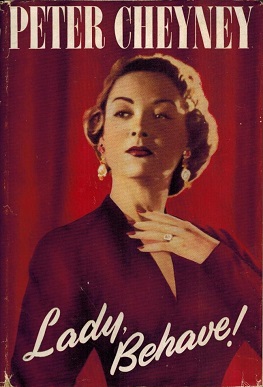
Lady, Behave! is a 1950 thriller novel by the British writer Peter Cheyney. It was the third part in a trilogy featuring Johnny Vallon, a hard-drinking former army officer now working as a private detective.

There's Trouble Brewing is a 1937 detective novel by Cecil Day-Lewis, written under the pen name of Nicholas Blake. It is the third in a series of novels featuring the private detective Nigel Strangeways.

The Worm of Death is a 1961 detective novel by the Anglo-Irish writer Cecil Day-Lewis, written under the pen name of Nicholas Blake. It is the fourteenth in a series of novels featuring the private detective Nigel Strangeways.

The Widow's Cruise is a 1959 British detective novel by Cecil Day-Lewis, written under the pen name of Nicholas Blake. It is the thirteenth in a series of novels featuring the private detective Nigel Strangeways.

The Morning after Death is a 1966 detective novel by Cecil Day-Lewis, written under the pen name of Nicholas Blake. It is the sixteenth and last entry in the series of novels featuring the private detective Nigel Strangeways.
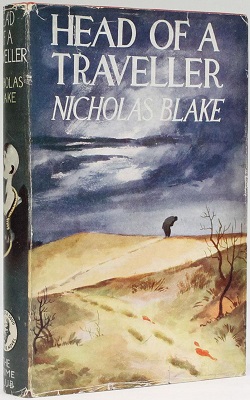
Head of a Traveller is a 1949 detective novel by Cecil Day-Lewis, written under the pen name of Nicholas Blake. It is the ninth in a series of novels featuring the private detective Nigel Strangeways.

Not to Be Taken is a 1938 mystery detective novel by the British writer Anthony Berkeley. It was one of several stand-alone novels he wrote alongside his series featuring the private detective Roger Sheringham. It was written when the Golden Age of Detective Fiction was at its height. It was published in the United States with the alternative title A Puzzle in Poison.

A Question of Proof is a 1935 detective novel by Cecil Day-Lewis, written under the pen name of Nicholas Blake. It is the first in a series of novels featuring the private detective Nigel Strangeways. Day-Lewis chose to write under an assumed name as he feared writing in the popular detective genre would harm his growing reputation as a serious-minded poet. Consequently, the publishers Collins advertised the book as being written by a "well-known writer" using a pen name. It was a commercial success selling around 200,000 copies in Britain and launching Day-Lewis, who quickly did become widely identified as the author, as one of the leading writers of the Golden Age of Detective Fiction.

The Slip-Carriage Mystery is a 1928 mystery detective novel by the Irish-born writer Lynn Brock. It was the fourth novel in his series featuring the character of Colonel Wyckham Gore. The previous novels in the series established Gore a popular character during the early stages of the Golden Age of Detective Fiction. A review in the Times Literary Supplement observed "The multiplication of false leads at the beginning is carried a little too far, and the story is at its best when the movement is greatest as it approaches and reaches its end".

Death in the House is a 1939 detective novel by the British writer Anthony Berkeley. It was one of a number of stand-alone novels he wrote alongside his series featuring the private detective Roger Sheringham. It was his penultimate novel, and his final whodunnit. In later years he continued writing reviews of other crime novels, but no longer wrote his own.

Cicely Disappears is a 1927 mystery novel by the British writer Anthony Cox, written under the pen name of A. Monmouth Platts. Cox used a variety of pseudonyms during his career, in this case based on two properties he was associated with in Watford. Cox had enjoyed success with novels featuring his private detective Roger Sheringham, at first published anonymously, and also wrote a number of stand-alone novels such as this one.
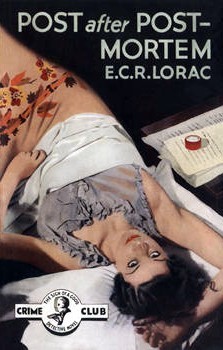
Post After Post-Mortem is a 1936 detective novel by E.C.R. Lorac, the pen name of the British writer Edith Caroline Rivett. It is the eleventh book featuring Chief Inspector MacDonald of Scotland Yard. Originally published by Collins Crime Club, it was reissued in 2022 by the British Library Publishing as part of a group of crime novels from the Golden Age of Detective Fiction.
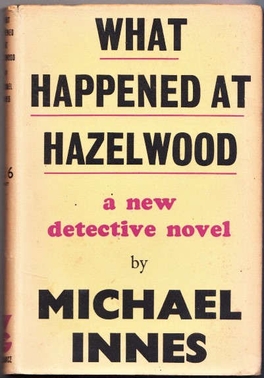
What Happened at Hazelwood is a 1946 detective novel by the British writer Michael Innes. It is a standalone novel from the author who was best known for his series featuring the Golden Age detective John Appleby. In this novel his role is fulfilled by Inspector Cadover who also appeared later in an Appleby novel A Private View. It takes the form of a country house mystery. Ralph Partridge writing in the New Statesman observed "Michael Innes may be a Professor of English in disguise but What Happened at Hazelwood would never win him a Chair of Detection. I suppose we should be grateful that it is not a surrealist thriller, and that Inspector Appleby is off duty."

A Private View is a 1952 detective novel by the British writer Michael Innes. It is the thirteenth in his series featuring John Appleby, now an Assistant Commissioner in the Metropolitan Police. It also features the characters of Inspector Cadover and the Duke of Horton who had previously appeared in What Happened at Hazelwood and Hamlet, Revenge! respectively. Appleby's wife Judith also plays a major role in the story.




















